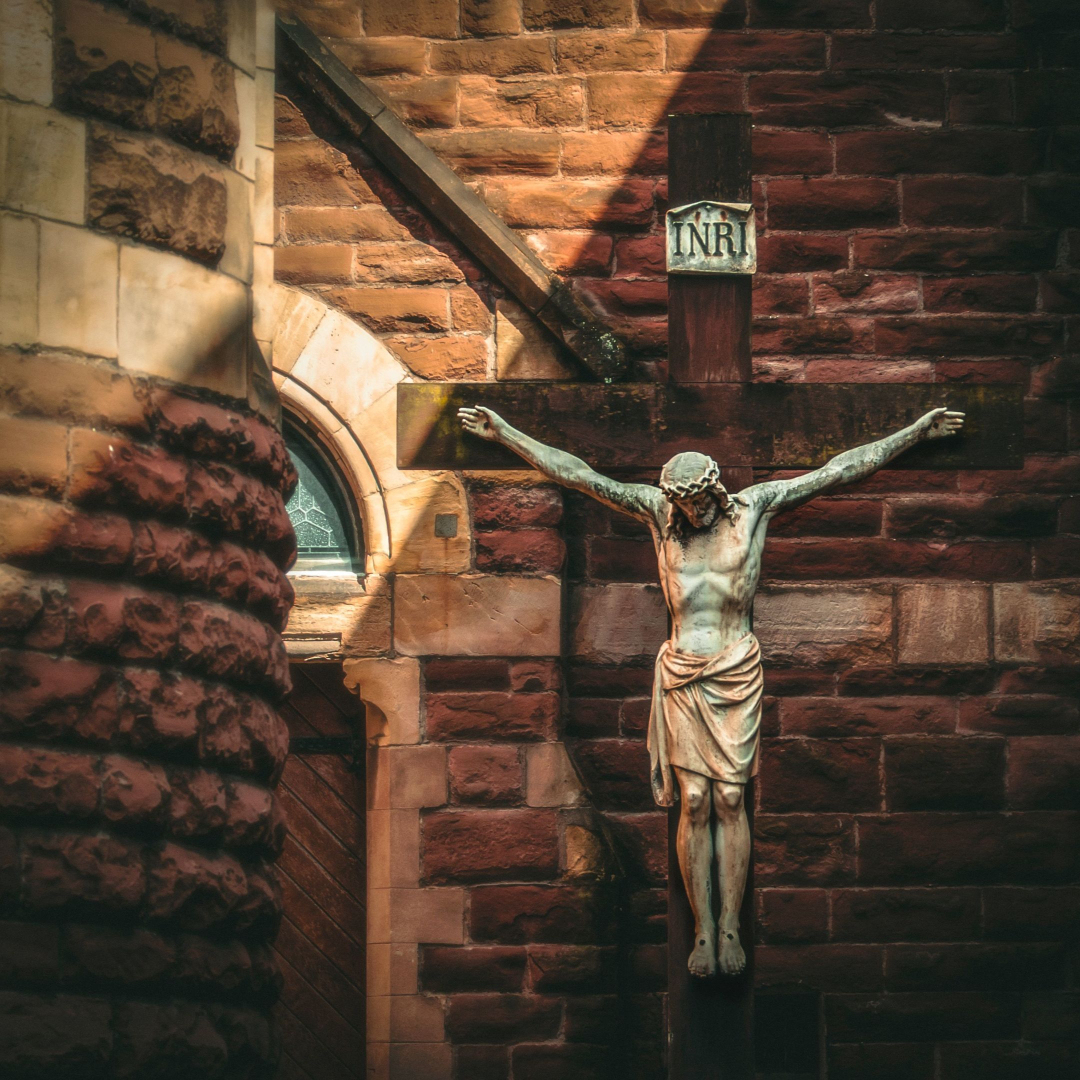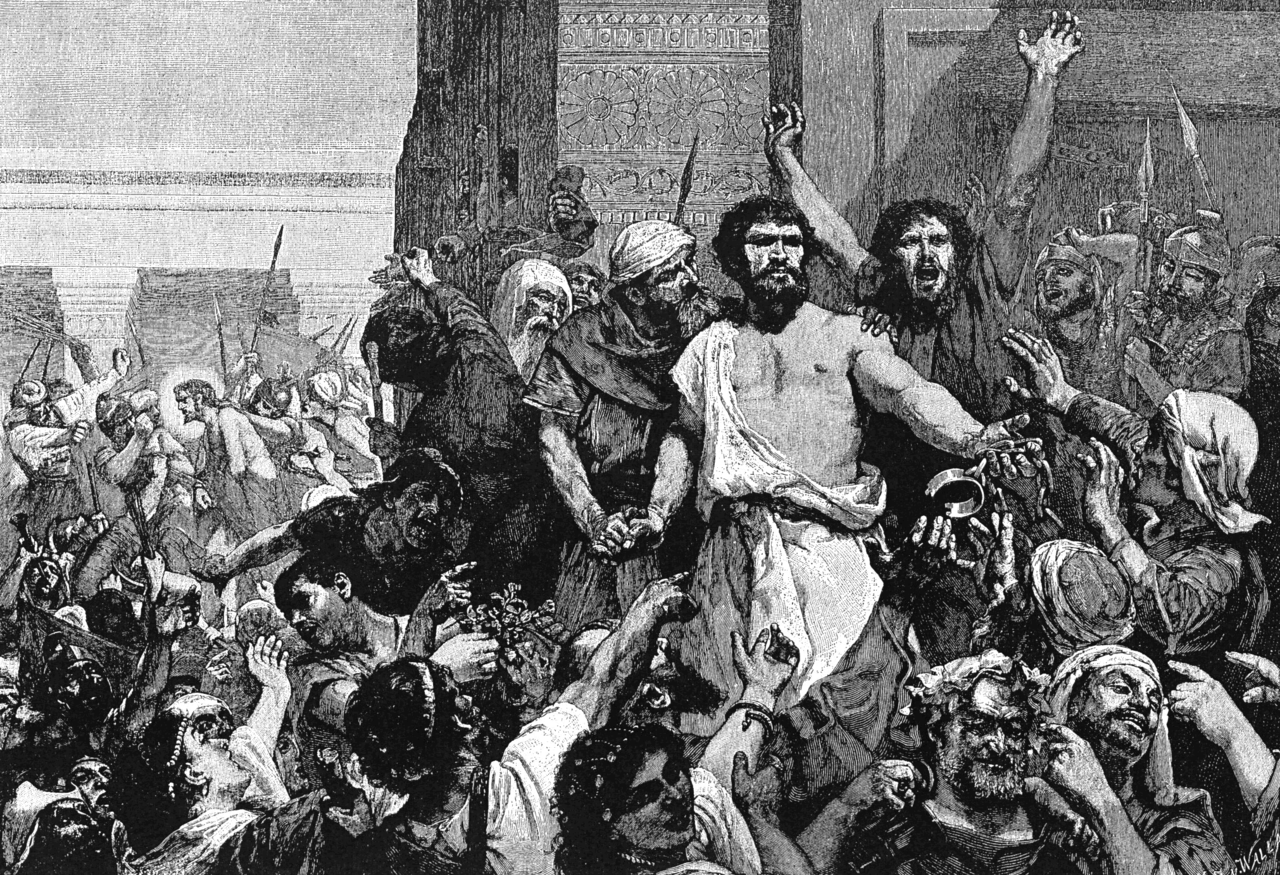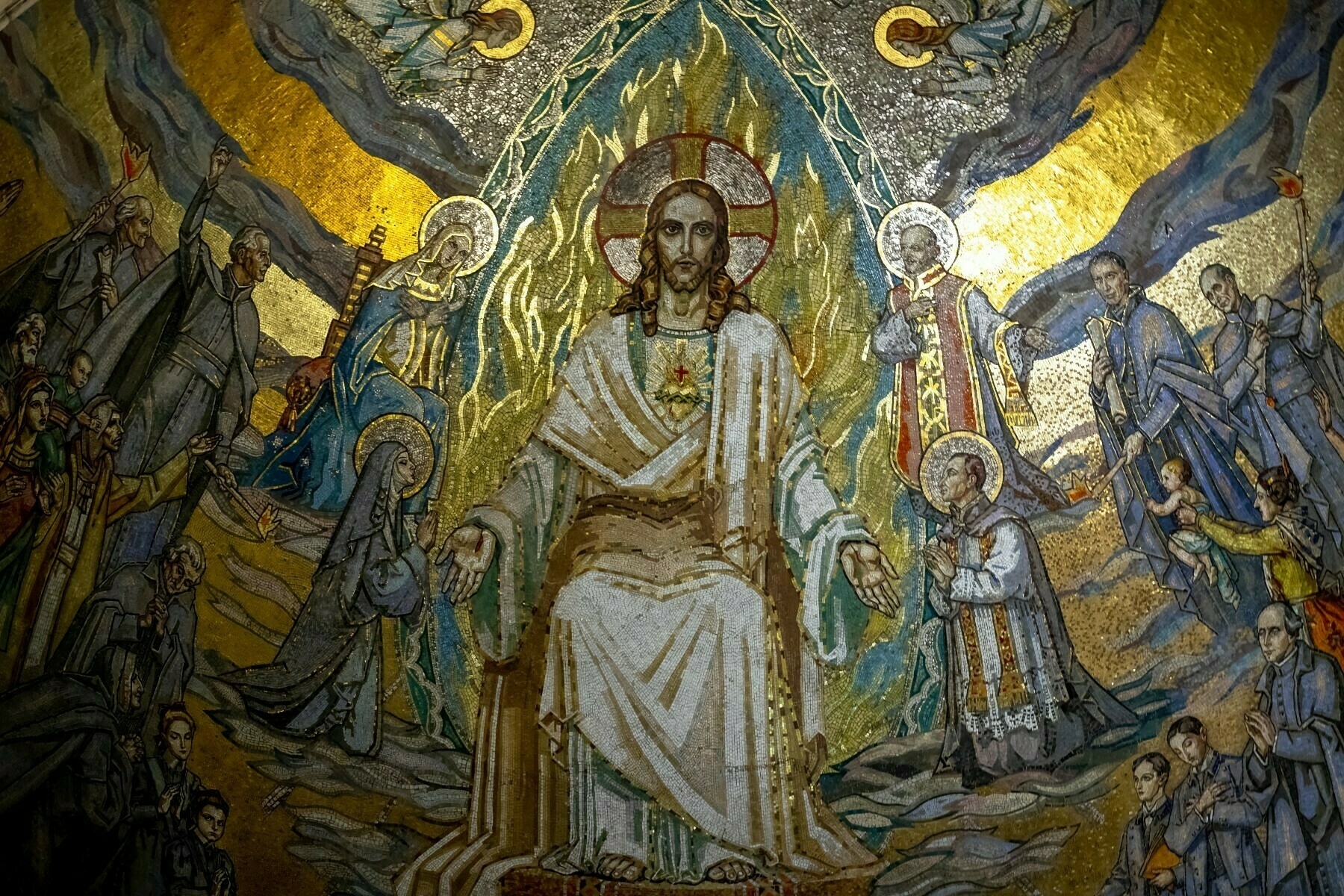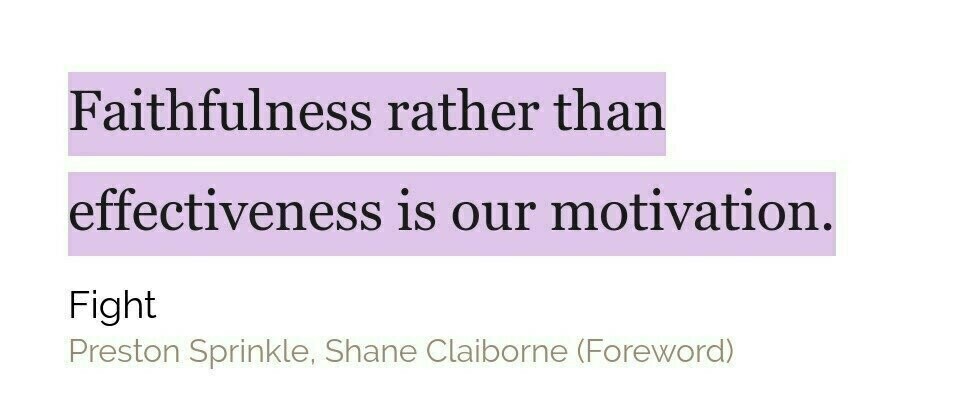Christian Nonviolence
- my involvement in national politics,
- my perspective on church governance,
- how I join parishioners in praying for our loved ones who are in enlisted,
- what I think about “last things,”
- how I share the Gospel in and out of the pulpit
Christ is the Mountain
Isaiah casts a breathtaking vision for the inevitable future that awaits us.
“He shall judge between the nations, and shall decide disputes for many peoples; and they shall beat their swords into plowshares, and their spears into pruning hooks; nation shall not lift up sword against nation, neither shall they learn war anymore.” (Isaiah 2:4, ESV)
Isaiah sees a world in which people, tired of violence and war, finally admit they are walking in darkness, that they don’t know how to move forward in the way that leads to life. In this vision, all come to the mountain of the Lord, where they finally learn how to be at peace and literally cultivate life in light of the truth of the ways of God.
It’s not as if God has ever not been teaching the world, how to live, though!
He has sent many prophets (see: the Bible).
It’s just that because of our tendency toward selfishness and self-destructiveness in our attitudes, actions, and affections, we irrationally ignore God’s life-giving word and do our own thing—even when our own thing leads to death.
This is what Jesus is talking about in Matthew:
“For as were the days of Noah, so will be the coming of the Son of Man. For as in those days before the flood they were eating and drinking, marrying and giving in marriage, until the day when Noah entered the ark, and they were unaware until the flood came and swept them all away, so will be the coming of the Son of Man.” (Matthew 24:37–39, ESV)
There’s nothing wrong with eating and drinking, marrying and giving in marriage, but the point was they did not at all change their way of life in light of what was going to happen, in light of what God was speaking to them.
Because of this, they were swept away, and quite literally missed the boat of God’s blessing and protection.
This could be any of us, at any time, if we are not careful, and if we continue to wander in the darkness of our own selfish confusion, and our self-destructive desires.
But God has not left the nations to walk in darkness. He sent us the light of his Son, Jesus Christ. He is the light, and he is the mountain where the good judgements of God take place.
St. Augustine said,
“Approach the mountain, climb up the mountain, and you that climb it, do not go down…There you will be safe, there you will be protected; Christ is your mountain of refuge ”
In his life, we see light, and we understand how to live. In his death on the cross, he condemned sin in the flesh by demonstrating the power of truly self-less love. By his Resurrection, he scatters the darkness from before our path and offers us a share in his eternal life now and forever by his Holy Spirit.
This is public knowledge!
Christ’s work is ours to receive freely by faith, and ours to share freely in word and deed with the world as we wait for all to recognize their need for mercy.
Photo by Cosmic Timetraveler on Unsplash

King of Forgiveness
Even the people of God can’t govern themselves in such a way that provides for the flourishing of the community. This is because all people, including the people that God calls to himself, are infected by their own selfish and self-destructive attitudes, actions, and affections.
So even when we try to rule with the best of intentions, the most thoughtful checks and balances, the best statements of human rights, we get all twisted up in our own way. Fear, greed, and pride lead to violence, war, and death. Every time. Every purely human empire falls eventually.
So, God promises steps in to rule directly. He will appoint leaders. He will raise up a human king in the line of the best human king Israel ever had, David. This king won’t fail in all the ways that David did, morally, ethically, politically. This king will finally be faithful to God’s rule…but how?
This King will be God himself come to us, as one of us.
This King is, of course, Christ himself.
This means whatever we think we know about how kingdoms are supposed to operate, supposed to be run, supposed work, takes a back seat as we are illumined by the way of Christ…which is just so very different than the kingdoms of this world.
We could think of many ways that we would establish a kingdom. But we probably wouldn’t think of allowing our enemies, foreign and domestic, crucify us under false pretenses and forgiving them anyways.
But this is what Jesus did.
Jesus' Kingdom is founded on forgiveness, ruled from the Cross, and advanced in the way of the Cross.
As naive and idealistic as that might sound, it’s how God does things. And his is the only Kingdom that will be left standing in the end.

The Downward Way of Christ and Salvation
We want our comfort and convenience. We want our power. We want to point out our success in pulling ourselves up by our own bootstraps. But Jesus subverts these “saviors” and offers something different. He offers himself. He offers forgiveness of sins and grace to forgive others.
And many of us simply can’t see how this can work in the real world. What’s the point of living if we’re uncomfortable much of the time? How will we get anything done without requiring others do what we think is best? Where’s our identity if we can’t build up ever-improving sense of accomplishment and expression?
These are reasonable questions, and this is why the message of the Cross, the Good News of God in Christ, the Gospel of Jesus, is a scandal. We often say it is counterintuitive, which means it doesn’t conform to how we might thing things go.
Yet, Jesus conquers our objections, because as God in the flesh, he conquered death. When we look a the results of our pursuit of saviors apart from him, we all find the same ending point: death itself, with no hope for anything past that. We might find temporary comfort, we might have our way for a bit, we might experience a self-esteem high that feels great! But that doesn’t keep us from dying as result of our and everyone else’s selfish and self-destructive attitudes, actions, and affections.
Jesus, on the other hand, proved that his way is the way of life by coming back to life. This why he said people had to understand “The Son of Man must suffer many things and be rejected… and be killed, and on the third day be raised…”
The Resurrection vindicates the downward way of Christ as the ultimate way of life and health and peace.
The Cross is the Throne
The religious and political leaders around Jesus were right that his kingdom threatened theirs, because he was at every turn exposing the evil and destructive practices of those that thought their life was best when they pursued their desires at the expense of others.
When they bring Jesus to their Roman ruler to do their dirty work, he tries to shield Jesus by giving them a choice to release Barabbas, whose name means “son of the father,” or Jesus, the man claiming to be the true Son of God.
After all they had seen him do, after all they had heard Jesus teach, in the end worldly leaders choose Barabbas—the violent, failed insurrectionist. To them, his way is the way that makes sense.
So Jesus, the one who healed, redeemed, liberated, and gave life, is condemned to death on the Cross. And because Jesus is committed to the Kingdom of life and peace and will not move forward with violence, he is met with violence, and that Cross becomes the Throne of heavenly grace, where he loves and forgives, offering grace upon grace even to those that crucified him.
That love was the power that swallowed death in death, and it was the Spirit of Love that raised Jesus from the dead, never to die again, vindicating his kingdom of life and peace as the only eternally victorious kingdom.
John’s apocalyptic vision proclaims:
Jesus “…has freed us from our sins by his blood and made us a kingdom, priests to his God and Father…” (Rev. 1:6 ESV).
Our objections to the way of Jesus, our blindness to the futility of violence, our inability to realize a better kingdom than the kingdoms we were born in–it’s all been dealt with on the Cross.
The church has been made—by grace alone—the place where the Christ’s Kingdom of self-giving love is revealed first to the kingdoms of this world.
As priests in this world, we are witnesses together, just like Christ, to the Truth of who God is in Christ, and what his eternal Kingdom is really like.

The Kingdom of Christ is fundamentally spiritual, but not merely spiritual
What makes a good king different from a bad king is the kind of power used and the way that power is used.
The thing that destines every king to fail is the unavoidable—and for every worldly king at some point irresistible—temptation to use their power to benefit themselves at the expense of others.
Devotional writer Jane Williams says,
“…what Jesus is offering as a description of his own kingship is truth—reality, you might say. Revelation calls it ‘the Alpha and Omega, who was and is and is to come’. If the actual reality of the world, from its creation to its end, is like Jesus, then this strange human obsession with power is an aberration. It has no ability to create, to redeem or to sanctify. Jesus’s challenge to Pilate’s kind of power is too slow and subtle for many of us, who long to use the weapons of worldly power to force victory for God. But if Jesus is the truth, then any other way is falsehood, and will fail. Reality, as it was and is and is to come, is shaped by a different kingship.”
Jesus lives as King over a kingdom that is certainly powerful, but he draws on a power not from this fallen world.
Jesus rules and reigns and fights battles in this world through the power of self-giving love and truth, which can only come from God himself.
His Kingdom is fundamentally spiritual in that it is conceived, birthed, and animated by the Spirit of Love who is God the Holy Spirit, but it is not merely spiritual because this Spirit takes up residence in his subjects, his followers, for the sake of the world.
Behold the heart of God in Christ
If Jesus gives us the Spirit of the Law in the Sermon on the Mount, then the Spirit of the Law is revealed as non-violent.
If the Spirit of the Law is non-violent, the heart of God is non-violent.
If the heart of God is non-violent, this changes everything for me:
My experience is that once you see the non-violent heart of God in Christ, you can’t unsee it.
Christ alone reveals to us the fullness of the heart of God. The more I look on him–incarnating, teaching, healing, dying, rising, ruling, and loving non-violently in it all–the more compelling the vision becomes.
And the vision just gets more compelling.

A sermon after January 6
Here’s last Sunday’s sermon for those that might be interested, in which I attempt to consider the recent terrorist attack on the Capitol building in light the of day’s Scriptures, and particular in light of how our baptism joins every Christian to the vocation of Christ.
The opening remarks were not recorded, but here’s the relevant section from my manuscript:
I think we have all felt acute distress in the past week, and understandably so. Not only has the pandemic continued to cause all kinds of death, destruction and suffering in our city and state, but we witnessed what has been described by experts as a violent, terrorist attack on our nation’s Capitol building by a politically and religiously motivated mob.
This is a time that calls for clarity and directness from Christian leaders and from the Church. So I have tried to choose all of my words for this message with special care and precision. I have sought counsel and prayer. I do not intend or wish to offend in any way. However, I do want speak truthfully and candidly. I watched in horror—live—as the mob grew more and more restless, ultimately overrunning the police and breaking in the building to disturb the legitimate democratic process. And I was so dismayed to see several images of those in the crowd carrying banners that said “Jesus Saves,” along with the so-called “Christian flag,” crosses, and many other Christian symbols and sayings. The crowd held banners proclaiming “Jesus is my Savior. Trump is my President.” To be clear, the increasingly close association of the Christian faith with American nationalism and partisan extremes is precisely why it is important for us to address this specific event as a church family…
Here’s a link to the complete manuscript.
What I believe about immigration and giving up the right to bear arms, in brief
I am in favor of Christians treating illegal immigrants humanely, hospitably, and fairly (and advocating for the same) as a witness to the future universal Kingdom, imperfectly present now in the Church, where the gates will never be shut at the end of the day (Rev. 21:25)
I am not in favor of the breaking of reasonable, just civil laws without extreme extenuating circumstances.
I am in favor of Christians voluntarily giving up their right to bear arms (and advocating for the same) as a witness to the future universal Kingdom, imperfectly present now in the Church, where swords will be beaten into plowshares (Is. 2:4)
I am not in favor of a blanket condemnation on all forms of self-defense or any penalty (ecclesiastical or civil) toward those that choose not to voluntarily give up their right to self-defense.
What About Hitler? The Myth of Ineffective Pacifism
When it comes to the non-violent message of Jesus, many people become troubled because of the what if scenarios.
What if my loved ones are attacked? What if I have no choice but to resort to violence in order to protect the innocent? And what about Hitler? Pacifism couldn’t have stopped him. Right?
Jesus had his disciples buy weapons. What's up with that?
How could a non-violent Jesus ask his disciples to buy swords, as he apparently does in Luke 22:36-39?
And he said to them, “When I sent you out with no moneybag or knapsack or sandals, did you lack anything?” They said, “Nothing.” He said to them, “But now let the one who has a moneybag take it, and likewise a knapsack. And let the one who has no sword sell his cloak and buy one. For I tell you that this Scripture must be fulfilled in me: ‘And he was numbered with the transgressors.’ For what is written about me has its fulfillment.” And they said, “Look, Lord, here are two swords.” And he said to them, “It is enough.” (Luke 22:35-38, ESV)It's important to note that there were at least 11 disciples hanging out and only two swords--hardly enough for a decent self defense of the group. Yet Jesus says in that passage, "it is enough!" The question is, why swords, and why only two?
Prophetic Action
In Luke 22:37 Jesus makes the connection between buying the swords and fulfilling the prophecy "he shall be numbered among the transgressors."Although Judas had betrayed his whereabouts, they still could have needed some excuse to make the arrest. An assembly of radical Jews with a couple weapons could have done that, and Jesus had clearly been stirring things up for some time.
Strong Language
Many commentators think that Jesus was using metaphorical language to urge his disciples to prepare spiritually for coming hardships. His statement "it is enough" is actually a rebuke of the disciples bringing literal swords. Just a few verses later Jesus stops Peter from using a weapon.A basic principle of biblical interpretation is that we use the clear passages to shed light on the less clear passages. “Turn the other cheek” (Matt. 5:39) and “love your enemies” (Matt 5:44) are explicit and easily understood, so they must enter the discussion as we consider the meaning of this passage.
Given the general thrust of Jesus' clear teaching and example, it seems most likely that Jesus was either deliberately provoking the authorities in order to fulfill prophecy and force a confrontation, or speaking metaphorically.
Up next: Addressing the myth of ineffective pacifism.
Doesn't Violence in the Old Testament Mean that Pacifism isn't Biblical?
A common objection to Christian non-violence is often articulated as follows:
A unified view of Scripture demands we accept justified violence based on the Old Testament. It takes unnecessarily complex hermeneutics to wiggle out of the fact that God both commands war (the invasion of Canaan) and instituted laws for self defense and capital punishment in the Mosaic Law.
A close look reveals this isn’t true.
On the national front, we have in the Old Testament a defined nation-state (Israel) that is being directly used by God to punish surrounding people groups and nations. This is holy war (commanded by God) and is restricted to Israel. All other nations that go to war are basically condemned, even as God says he will use them for his purposes to accomplish justice and teach other nations. In the NT, however, Jesus reveals to us through the Apostle Paul that God’s chosen people is no longer a single nation-state, but rather a gathering people across national/ethnic boundaries whose fight is not against flesh and blood (cf. Eph. 6:12; Gal. 3:38). The battle lines and purposes have been redrawn.
This is a fairly straightforward understanding of Old Covenant/New Covenant. There is continuity (a chosen people) but a tweak toward perfection (no longer defined by human politics, ruled not by humans but by Jesus at the head via the Holy Spirit, etc). The church stands as a light to the nations by no longer waging holy war, rather living as ministers of the reconciliation (cf 2 Cor 5:18) that Jesus brought between God and man, peaceful ambassadors for Christ if you will.
On the individual level, we see Jesus recasting the OT law in the Sermon on the Mount (cf Matt. 5:38-42). “You have heard it said…but I say to you…” is the refrain. His teaching on retaliation is not confined only to being persecuted for being his follower–it is a perfection of a concept (“an eye for an eye”) that is a “rule of life.” The examples that Jesus gives of getting slapped, giving up one’s tunic, and going the extra mile are likewise not things that happen as a result of special persecution, but were daily events for Jews and others living in Roman-occupied land. Given the relation of this to the Mosaic Law, his previous statements on the blessedness of peacemakers, and his subsequent comments on loving your enemies (which for 1st century Jews meant real, dangerous enemies, not just those that weren’t nice to them), it’s tough to see these statements as anything but broadly applicable.
This isn’t writing off the Old Testament, it’s seeing the Old Covenant as fulfilled in Christ, and Christ as a clearer revelation of God’s will and character.
Next up: Why non-violent Jesus asked his disciples to buy swords in Luke 22:36.
A Brief, Scriptural Defense of the Non-Violent Message of Jesus
This week’s Advent focus is peace, so I thought it would be appropriate to write about something that’s been developing in my theology for some time: the implications of Jesus as the Prince of Peace (cf. Isaiah 9:6).
Clearly, Christ came to make peace between God and man. As we follow Christ, we are called to be peacemakers ourselves by the power of the Spirit (cf. Matt 5:9; 2 Cor 5:18-19).
Looking at the plain words of Jesus in their historical context–along with the rest of New Testament–convinces me that a non-violent ethic is explicitly and consistently affirmed throughout the Scriptures. Non-violence, also called pacifism, is an essential part of living out the implications of the Gospel.
The Scriptural Argument
Jesus explicitly commands an ethic committed to non-retaliation, even when one is unjustly attacked. Remember that persecution isn’t just political or social marginalization; it is often marked by violent oppression.
“You have heard that it was said, ‘An eye for an eye and a tooth for a tooth.’ But I say to you, Do not resist the one who is evil. But if anyone slaps you on the right cheek, turn to him the other also." (Matthew 5:38-39, ESV)
“You have heard that it was said, ‘You shall love your neighbor and hate your enemy.’ But I say to you, Love your enemies and pray for those who persecute you, so that you may be sons of your Father who is in heaven. For he makes his sun rise on the evil and on the good, and sends rain on the just and on the unjust." (Matthew 5:43-45, ESV)
Then they came up and laid hands on Jesus and seized him. And behold, one of those who were with Jesus stretched out his hand and drew his sword and struck the servant of the high priest and cut off his ear. Then Jesus said to him, “Put your sword back into its place. For all who take the sword will perish by the sword. (Matthew 26:50-52, ESV)
Jesus answered, “My kingdom is not of this world. If my kingdom were of this world, my servants would have been fighting, that I might not be delivered over to the Jews. But my kingdom is not from the world.” (John 18:36, ESV)
Paul affirms and clarifies the teaching of Jesus on this point, calling us to radical, self-giving love even for our enemies:
Bless those who persecute you; bless and do not curse them. Rejoice with those who rejoice, weep with those who weep. Live in harmony with one another. Do not be haughty, but associate with the lowly. Never be wise in your own sight. Repay no one evil for evil, but give thought to do what is honorable in the sight of all. If possible, so far as it depends on you, live peaceably with all. Beloved, never avenge yourselves, but leave it to the wrath of God, for it is written, “Vengeance is mine, I will repay, says the Lord.” To the contrary, “if your enemy is hungry, feed him; if he is thirsty, give him something to drink; for by so doing you will heap burning coals on his head.” Do not be overcome by evil, but overcome evil with good. (Romans 12:14-21, ESV)
This is key for Christians: we are to imitate Christ.
Therefore be imitators of God, as beloved children. And walk in love, as Christ loved us and gave himself up for us, a fragrant offering and sacrifice to God. (Ephesians 5:1-2, ESV)
Christ loved us and died for us–his enemies–and never once responded violently to those that abused him.
For to this you have been called, because Christ also suffered for you, leaving you an example, so that you might follow in his steps. He committed no sin, neither was deceit found in his mouth. When he was reviled, he did not revile in return; when he suffered, he did not threaten, but continued entrusting himself to him who judges justly. (1 Peter 2:21-23, ESV)
We must ask ourselves these questions:
Are the Scriptures clear on this front? Given that the witness of the early church is non-violent, why do many Christians now condone violence? Is there a solid biblical case for or against violence as a God-blessed option for the Church? For individuals? Is the non-violent idea difficult for me to accept? If so, is it because it is not clear in the Scriptures, or because it does not seem like it would be effective according to my own standards?
Conclusion
An ethic of non-violence is actually explicit in the teachings of Jesus and is affirmed in the rest of the New Testament. It is a distinctive mark the of the New Covenant; God’s people are to be known as peacemakers. Jesus is the ultimate revelation of God, and his is a kingdom of peace.
For in him all the fullness of God was pleased to dwell, and through him to reconcile to himself all things, whether on earth or in heaven, making peace by the blood of his cross. (Colossians 1:19-20, ESV)
Make sure to stay tuned for the rest of this series, where I respond to the objections that made me seriously doubt whether or not Jesus really taught non-violence.
 NRH
NRH